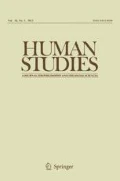References
Butler, J. (1995). For a Careful Reading. In S. Benhabib, J. Butler, D. Cornell and N. Fraser (Eds.), (with an introduction by Linda Nicholson), Feminist Contentions: A Philosophical Exchange. London/New York: Routledge.
Butler, J. (1993). Bodies That Matter. New York: Routledge.
Farías, V. (1989). Heidegger und der Nationalsozialismus. Frankfurt: S. Fischer.
Fraser, N. (1995). Pragmatism, Feminism, and the Linguistic Turn. In S. Benhabib, J. Butler, D. Cornell and N. Fraser (Eds.), (with an introduction by L. Nicholson), Feminist Contentions: A Philosophical Exchange. London/New York: Routledge.
Lettow, S. (2001). Die Macht der Sorge. Die philosophische Artikulation von Geschlechterverhältnissen in Heideggers “Sein und Zeit”. Tübingen: Diskord.
Author information
Authors and Affiliations
Rights and permissions
About this article
Cite this article
Nagel, M. P.J. Huntingdon, Ecstatic Subjects, Utopia, and Recognition: Kristeva, Heidegger, Irigaray. Human Studies 25, 251–256 (2002). https://doi.org/10.1023/A:1015540124055
Issue Date:
DOI: https://doi.org/10.1023/A:1015540124055

